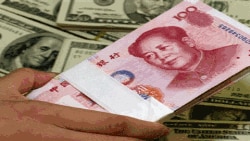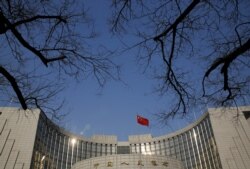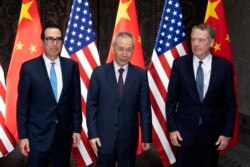China's yuan currency dropped to its lowest level in 11 years on Monday, following threats from U.S. President Donald Trump to impose new 10 percent tariffs on $300 billion worth of Chinese products starting September 1.
The yuan's drop crossed the psychologically sensitive level of 7 to the U.S. greenback — the first time since its offshore trading in Hong Kong began in 2010 and the lowest level since April 2008.
Observers expect the drop will fuel tensions with Washington while signaling the possibility of a currency war.
A weakening yuan
U.S. officials have long said that a weak yuan makes Chinese exports cheaper, hurting foreign competitors and swelling Beijing's trade surplus.
China’s central bank blames the yuan’s drop on what it calls "the U.S. unilateral trade protectionism, as well as expectations of more tariffs on China" while pledging to stabilize the currency.
“The PBOC [People’s Bank of China] has the experience, confidence and ability to keep the yuan exchange rate basically stable at a reasonable equilibrium level,” the bank said in a statement without elaborating on what it considered an appropriate level.
Lu Suiqi, associate professor of economics at Peking University, said the yuan’s drop reflected the Chinese market’s negative sentiment.
“The trade war is due to be escalated, which will impact [China’s] volume of both exports and imports and lead to the fluctuation of the yuan’s exchange rate against the U.S. dollar. The yuan’s drop and the trade war is correlated… And the market has shown worries,” Lu said.
Disappointment with tariff increases
Meanwhile, two major foreign business groups in Beijing — the American Chamber of Commerce (AmCham) and the European Union Chamber of Commerce in China — have also expressed disappointment with the threatened tariff hike.
In a press statement, AmCham in China on Monday called the latest tariff decision “dispiriting,” saying “tariffs are paid by consumers and harm business, and many [of its members] are necessarily taking steps to mitigate risks.”
AmCham urges both countries to continue negotiations in a constructive and result-oriented manner so as to reach a sustainable agreement soon while using their respective tariff exclusion processes to minimize the impact on consumers.
It further called on China to take initiatives in pushing forward domestic structural reforms.
“It is our belief that substantial further reform and opening of the Chinese economy to foreign business is essential for any mutually beneficial deal, rather than a series of cosmetic and drawn-out trade concessions,” its statement said.
Strategic pressure?
In an email to VOA, Joerg Wuttke, president of the European Union Chamber of Commerce in China, argued that the additional tariff fails to provide the right amount of “strategic pressure” to push China into pursuing timely and wide-ranging reforms.
“At a time when the U.S.-China economic relationship is badly in need of thoughtful and meaningful repair, this tariff wrecking ball — which will effectively impact everything that Americans buy from China — will only empower Chinese voices calling for self-reliance and disengagement,” Wuttke said in the email.
Analysts believe the new tariff punishment is part of a negotiating tactic by President Trump to pressure China into making more concessions before both states engage in the next round of trade talks in Washington next month.
Whether it will work remains to be seen, said Darson Chiu, a research fellow at the Taiwan Institute of Economic Research.
Chiu said that there is little room for China to retaliate with serious countermeasures such as punitive tariffs on American imports since China’s own economy will be badly hurt if it is to hike tariffs on the remaining $200 billion worth of U.S.-made high-tech imports.
Neither will China continue to cut its $1 trillion-worth U.S. Treasury holdings as such selling will only hurt their own worth, he said.
China is also unlikely to toughen up against China-based American businesses as such a move will only play into Trump’s hands and result in the exodus of China-based American manufacturers to their own home market, Chiu added.
What’s left for China to do is to cut its economic dependence on exports while boosting domestic demand and seeking support from its non-U.S. allies by inking a regional comprehensive economic partnership with them so as to be a rival to the U.S., according to the researcher.
Waiting it out?
China will also resort to the strategy of “waiting it out” rather than caving in to Washington’s demand, the researcher said.
“They [China] believe, if they can drag out of the tariff fight with the U.S., mounting internal pressure in the U.S. [from businesses which depend on the Chinese market] may force Trump to change his mind,” Chiu said.
"On the other hand, they [China] also expect [candidates] of the Democratic Party such as Joe Biden to see a rising popularity. That may push Trump to seek a quick end to the trade war so that he can put his focus back on dealing with the Democratic Party," the researcher added, referencing the U.S. presidential campaign.







